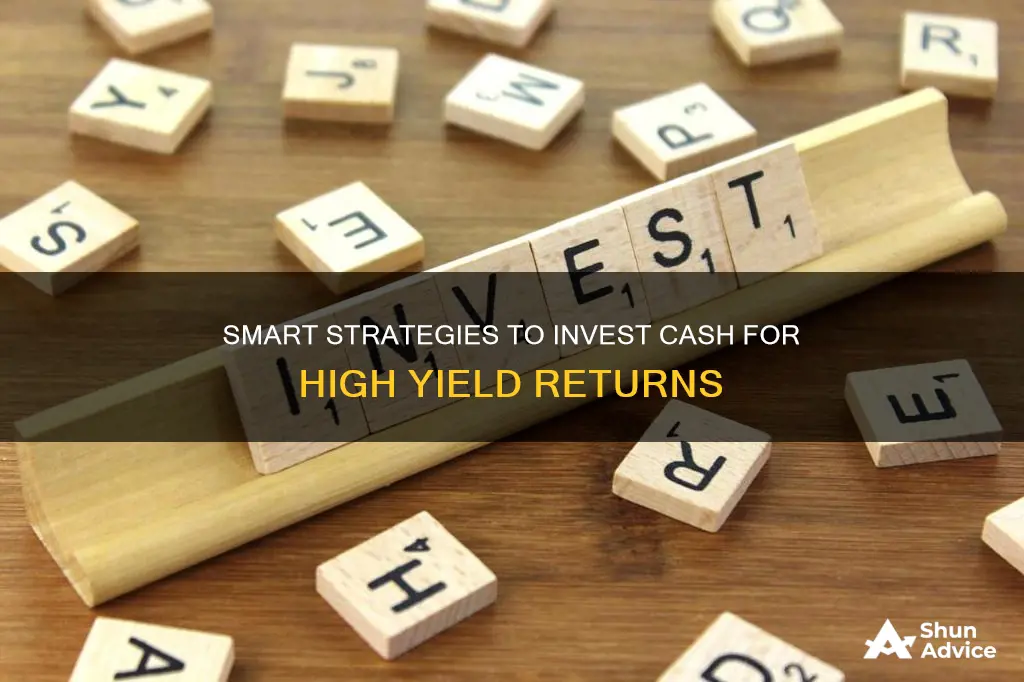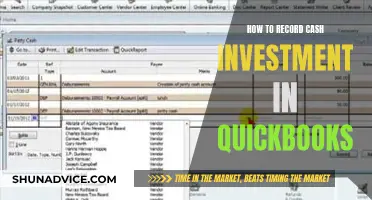
With interest rates and inflation rising, it's important to consider where to invest your cash to get the best yield. There are several options to consider, each with its own advantages and disadvantages.
One option is a high-yield savings account, which typically offers a higher interest rate than a traditional savings account. These accounts are easily accessible, but there may be limitations on the number of withdrawals or transfers you can make.
Another option is a money market account, which offers features such as check-writing privileges, debit cards, and ATM access. Money market accounts also tend to have higher interest rates than savings accounts, but they may have similar withdrawal restrictions.
Certificates of deposit (CDs) are another option, offering a fixed rate of return in exchange for locking away your funds for a set period. CDs generally offer higher yields than savings accounts or money market accounts, but there may be early withdrawal penalties if you need to access your money sooner.
For those seeking a longer-term investment, corporate bond funds or dividend stock funds can provide higher returns but come with higher risk.
Ultimately, the best option for investing your cash will depend on your financial goals, risk tolerance, and time horizon. It's important to carefully consider the advantages and disadvantages of each investment option before making a decision.
| Characteristics | Values |
|---|---|
| Accessibility | Liquidity is important. If you need quick access to your money, look for more liquid offerings. |
| Insurance | The Federal Deposit Insurance Corporation (FDIC) insures up to $250,000 in CDs and savings accounts. |
| Restrictions | Some accounts may require a minimum balance. |
| Yields | CDs, high-yield savings accounts, and money market funds are the best places to keep your cash when it comes to interest rates. Treasury bills also offer decent yields at low risk. |
What You'll Learn

High-yield savings accounts
Barclays Tiered Savings Account:
Barclays savings account offers a solid interest rate with no monthly fees or minimum balance requirements. It also has a tool for setting savings goals, which is not a common feature. However, Barclays does not offer a checking account, which may be a drawback for those who want to keep their spending and savings in the same place.
SoFi Checking and Savings:
SoFi offers a combination of checking and savings accounts, with the savings account earning an APY of 4.20% and the checking account earning 0.50% APY. There is no minimum deposit requirement or monthly maintenance fee. SoFi also offers a rewards checking account, but it is only available to those with an American Express credit card.
CIT Bank Platinum Savings:
CIT Bank's Platinum Savings account pays 4.55% APY on balances of $5,000 or more. While there is no monthly fee, you need to maintain a balance of at at least $5,000 to earn the high rate. CIT Bank also offers other savings accounts with slightly lower minimum balance requirements and competitive yields.
Openbank High Yield Savings:
Openbank's High Yield Savings account offers a much higher yield than the national average, helping your money earn more interest each month. There is a minimum balance requirement of $500 to earn the APY.
UFB Portfolio Savings:
UFB Direct's Portfolio Savings account offers a competitive yield and ATM access, which is not common among online banks. There is no minimum balance requirement or monthly fee.
American Express High Yield Savings Account:
The well-known credit card company, American Express, offers a savings account with a competitive yield, no monthly fee, and no minimum balance requirement. They also offer a rewards checking account for those with an American Express credit card.
Capital One 360 Performance Savings:
This savings account from Capital One earns the same rate on all balances and has no minimum deposit requirements or monthly fees. Capital One also offers a checking account that earns interest and has no monthly fees.
EverBank Performance Savings:
EverBank's savings account offers a competitive yield with no minimum deposit requirement or monthly fee.
When choosing a high-yield savings account, consider factors such as interest rates, monthly fees, minimum balance requirements, and ease of access. It is also important to note that savings rates may fluctuate, so be sure to keep an eye on the latest rates to ensure you are getting the best yield.
Calculating Net Cash Flow: Investing Activities Explained
You may want to see also

Money market accounts
- Vio Bank: 4.90% APY, $100 minimum deposit
- Quontic Bank: 4.75% APY, $100 minimum deposit
- CFG Community Bank: 4.65% APY, $1,000 minimum deposit
- UFB Direct: 4.31% APY, no minimum deposit
- EverBank: 4.30% APY, no minimum deposit
- Sallie Mae Bank: 4.20% APY, no minimum deposit
- Ally Bank: 4.00% APY, no minimum deposit
- First Internet Bank of Indiana: 3.77% APY, $100 minimum deposit
- Synchrony Bank: 2.25% APY, $1 minimum deposit
Smart Ways to Invest 40K: Strategies for Success
You may want to see also

Government bonds
When you buy a government bond, you are essentially giving a loan to the government. The government then agrees to pay you back the face value of the loan on a specific date and to make periodic interest payments, usually twice a year, along the way.
- They provide a steady stream of income.
- They offset some of the volatility you might experience from owning stocks.
- Treasury Bills: These have maturities of one year or less and are issued at a discount, meaning you pay less than the face value when you buy it, but you get the full face value back when the bond matures.
- Treasury Notes: These have maturities between two and ten years.
- Treasury Bonds: These have maturities of more than ten years, most commonly 30 years.
- Treasury Inflation-Protected Securities (TIPS): These offer a return that fluctuates with inflation.
- Government Agency Bonds: Some agencies of the US government, such as the Government National Mortgage Association (GNMA), can also issue bonds. These are typically high-quality and very liquid.
- Municipal Bonds: These are issued by states and municipalities and are generally safe, although they are not as safe as US government bonds.
While government bonds are considered safe investments, there are still some risks to consider:
- Interest Rate Risk: As with any loan, changes in overall interest rates will impact the value of your bond investment. Bonds with longer maturities are more sensitive to interest rate changes and generally offer higher yields to compensate for this risk.
- Credit Risk: There is a chance that the bond issuer will fail to make interest or principal payments on time or default on the loan entirely. While this risk is lower for government bonds compared to corporate bonds, it is not non-existent, especially for municipal bonds.
You can buy government bonds directly from the government or through a brokerage firm. When investing in government bonds, it is important to consider factors such as the maturity, interest rate, credit rating, and yield. Additionally, keep in mind that the price of a bond is inversely related to its yield. So, if interest rates rise, the price of your bond will likely fall, and vice versa.
Smart Ways to Invest Your $25K Windfall
You may want to see also

Treasury bills
T-bills are sold at a discount from their face value and mature at face value. The difference between the purchase price and the maturity value is the interest earned by the investor. For example, if you buy a $1,000 T-bill at a discounted rate of $950 with a 5% yield, you will earn a return of $50 at the end of the year when the bill matures and you receive the full face value.
T-bills are usually sold in denominations of $100, with additional purchases in increments of $100. The minimum purchase of T-bills directly from the Treasury is $100, with a maximum denomination of $10 million in non-competitive bids. The Treasury sells T-bills through auctions using a competitive and non-competitive bidding process.
T-bills are only issued electronically, and investors can buy them in electronic form from TreasuryDirect, the platform of the US Treasury, or from a brokerage firm, which could cost a small fee. T-bills can also be bought and sold on the secondary market.
The maturities available for T-bills are four, eight, 13, 17, 26, and 52 weeks (or one through four, six, and 12 months). T-bill rates depend on interest rate expectations. When interest rates are expected to rise, longer maturity dates pay more than shorter dates.
While T-bills are considered safe investments, they are subject to interest rate and inflation risks. They also offer low returns compared to other debt instruments and do not offer regular interest payments. The interest income from T-bills is also subject to federal income tax.
Despite these considerations, T-bills can be a good investment option for those seeking a safe and secure investment with a short-term maturity.
Understanding Cash Flows from Ordinary Investing Activities
You may want to see also

Certificates of deposit
CDs are a safer and more conservative investment than stocks and bonds, but they offer a lower opportunity for growth. They are also protected by the same federal insurance that covers all deposit products. The Federal Deposit Insurance Corp. (FDIC) insures bank accounts, and the National Credit Union Administration (NCUA) insures credit union accounts. In both cases, up to $250,000 of your funds are protected in the rare event that the institution fails.
CDs come in a variety of terms, from 3-, 6-, or 12-month terms to 4-, 5-, and even 10-year terms. The interest rates on CDs are mostly fixed, though there are variable-rate CDs that could earn a higher return if rates rise. With a fixed-rate CD, you'll know exactly how much you'll earn by the end of the term, but it could hurt you if rates rise after you're locked in.
CDs are a good idea if you have cash that you don't need now but will want within a few years. They can help you save for a vacation, a new home, or a car. CDs may also be a good option if you want to invest some of your savings more conservatively, achieving lower risk and volatility than investing in the stock and bond markets.
One of the downsides of CDs is that your money is locked into the investment. However, this can be beneficial for savers who worry about withdrawing from their savings. The fixed term of a CD and the penalty for early withdrawal can deter spending.
CDs can be purchased directly from banks, but many brokerage firms and independent salespeople also offer them. These individuals and entities are known as "deposit brokers," and they can sometimes negotiate a higher interest rate for a CD by promising to bring a certain amount of deposits to the institution.
Understanding Cash Flows from Investing Activities
You may want to see also
Frequently asked questions
Some short-term investment options include high-yield savings accounts, money market accounts, cash management accounts, short-term bond funds, and certificates of deposit (CDs).
Some long-term investment options include long-term corporate bond funds, dividend stock funds, value stock funds, small-cap stock funds, and real estate investment trusts (REITs).
Short-term investments typically carry lower risks than long-term investments. However, there is still a possibility of losing purchasing power due to inflation if the interest rates are too low. Additionally, some short-term investments may have restrictions on the number of withdrawals or transfers allowed.
Short-term investments offer stability, low risk, liquidity, and diversification. They are highly liquid and stable, providing easy access to your money with low or no costs.







